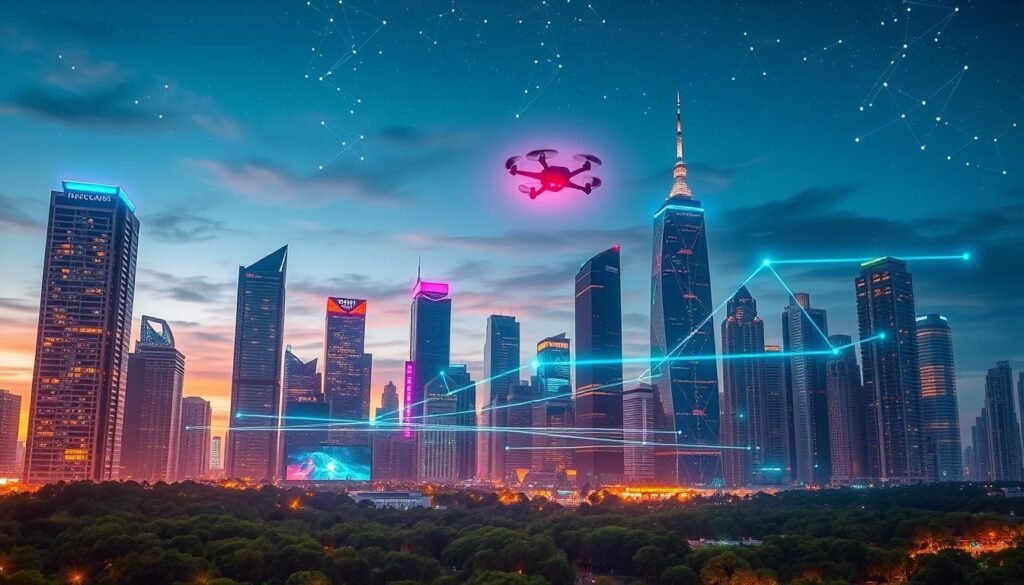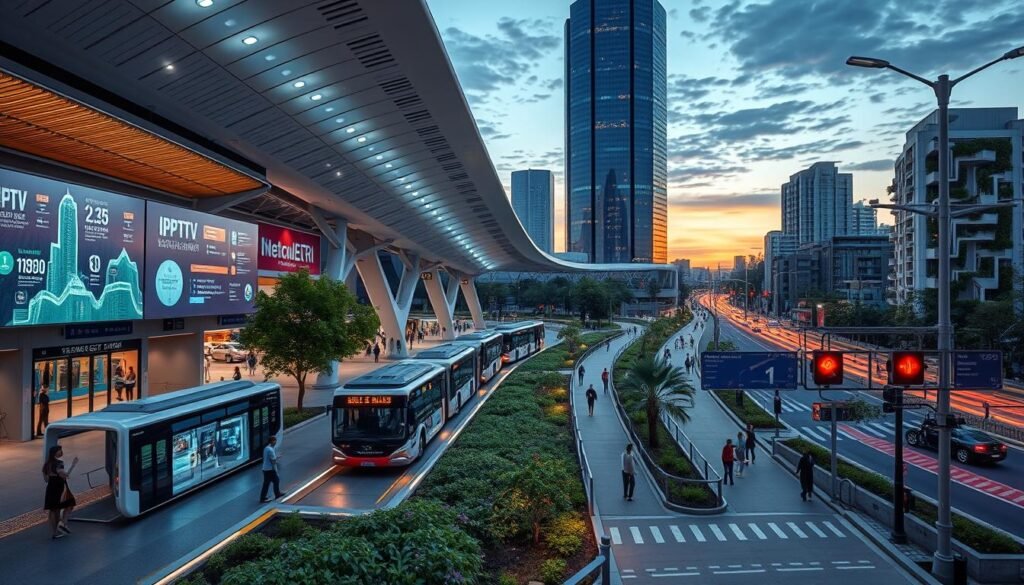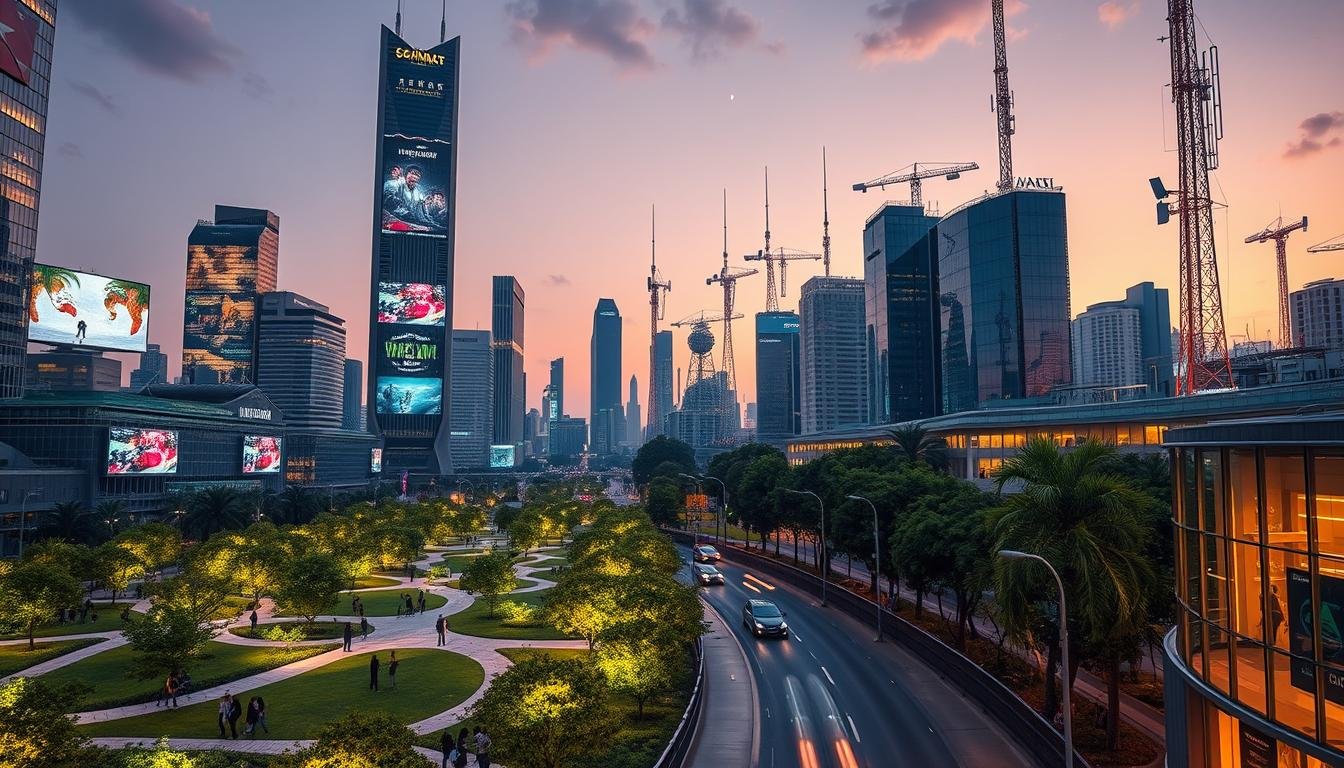In the UK, a new era of entertainment and connectivity is starting. Internet Protocol Television (IPTV) is changing how people in smart cities live. It combines digital media, interactive services, and real-time data analytics.
This technology is set to change city life. It will change how people and visitors interact with their surroundings.
The UK is becoming more digital, and IPTV is key in this change. It uses IP-based networks to bring entertainment and information to people’s hands. IPTV offers everything from public displays to emergency alerts, making city life better.
Key Takeaways
- IPTV is revolutionising the entertainment and connectivity landscape in smart cities across the UK.
- IP-based networks enable the delivery of a wide range of digital media and interactive services to citizens.
- IPTV is enhancing the quality of life in urban centres through innovative public displays, interactive kiosks, and personalised content.
- The integration of IPTV with smart city infrastructure is driving the digital transformation of city life.
- Advancements in IPTV technology are poised to redefine the urban experience for residents and visitors alike.
Understanding the Evolution of Urban Entertainment Systems
Cities are changing, and so is entertainment. We’re moving from old ways to new ones. Now, we use IP-based video delivery to watch and interact with content. This change is making cities smarter and their entertainment better.
Traditional Broadcasting vs IP-Based Solutions
Old broadcasting methods used signals from the sky. But IP-based video delivery is changing that. It’s more flexible and lets us watch what we want. This shift is making cities more connected and their entertainment systems smarter.
The Digital Transformation of City Infrastructure
Cities are getting a digital makeover. Fast networks, 5G, and edge computing are making IP-based video delivery smooth. This change is key for cities to link entertainment with smart city systems.
Key Components of Modern Urban Entertainment
- IPTV and streaming platforms for personalised content delivery
- Digital signage and interactive displays for public space entertainment
- Smart transportation hubs with integrated IPTV services
- Edge computing solutions for low-latency video processing and content caching
- Data analytics and viewer behaviour insights to optimise urban entertainment offerings
The future of urban entertainment is exciting. It’s all about technology, infrastructure, and what people want. As cities get smarter with IP-based video delivery, smart city connectivity, and urban data analytics, entertainment will get even better.
IPTV in Smart Cities: Core Technologies and Infrastructure
Smart cities aim to improve life for everyone. IPTV (Internet Protocol Television) is key to this. It changes how we watch TV and connects us better.
IPTV uses a strong fibre-optic network. This network is fast and reliable. It brings top-quality TV and live data to homes and public areas.
IPTV infrastructure opens up new ways to experience life. Imagine virtual tours or remote doctor visits. It’s all possible with IPTV.
IoT sensor integration helps smart cities collect important data. These sensors watch over the city, tracking things like air quality and traffic. This helps officials make better choices and use resources wisely.
Edge computing for video processing is also vital. It makes watching TV smoother by processing videos locally. This cuts down on delays and keeps data centres running smoothly.
“The future of urban entertainment lies in the seamless integration of IPTV and smart city technologies, transforming the way we experience and interact with our surroundings.”
As cities get smarter, IPTV, IoT, and edge computing will change entertainment. They will make cities more connected, efficient, and fun for everyone.
The Role of 5G Networks in Urban IPTV Distribution
As smart cities grow, fast and reliable internet is key. IPTV infrastructure will greatly benefit from 5G’s advancements.
High-Speed Connectivity Requirements
IPTV needs strong, steady internet for smooth low-latency video streaming. 5G networks offer better bandwidth and less delay. This means IPTV in smart cities will change, offering uninterrupted access to content.
Network Slicing for Video Services
5G’s network slicing lets it create special virtual networks for different needs. For IPTV, this means video traffic gets priority. This ensures top-notch, uninterrupted streaming.
Coverage and Capacity Planning
5G networks must cover all areas of smart cities well and have enough capacity. By placing 5G base stations wisely and managing resources, cities can make sure IPTV works everywhere. This fits perfectly with the city’s smart systems.

“The synergy between 5G and IPTV in smart cities has the potential to redefine the way urban residents consume and interact with digital entertainment.”
Integrating IPTV with Smart City Control Centres
In today’s smart cities, combining IPTV with centralised control centres is key. It helps manage cities better and improve public services. Urban data analytics, public safety monitoring, and intelligent transportation systems are at the heart of this. They help cities run smoother and make life better for everyone.
IPTV plays a big role in keeping cities safe. Cameras and sensors around the city send live video and data to the control centre. This lets authorities act fast in emergencies and manage traffic better.
Also, IPTV works well with smart traffic systems. It lets city officials watch traffic, change signals, and share updates on roads and transport. This cuts down on traffic jams and makes travel easier and greener.
Adding IPTV to smart city control centres is a big step in making cities better. It uses new tech to use resources wisely, improve services, and make cities better places to live.
“The integration of IPTV with smart city control centres is a game-changer, enabling cities to become more responsive, efficient, and sustainable.”
As cities get smarter, IPTV’s role will grow. It will help cities make better decisions and improve life for everyone. By linking IPTV with control centres, cities can enter a new era of smart management.
Public Space Entertainment: Digital Signage and Interactive Displays
In today’s smart cities, IP-based video delivery is changing how we enjoy public spaces. Cities are using urban data analytics to make public areas more engaging and informative. This includes interactive kiosks and emergency broadcasting systems.
Interactive Kiosks and Information Points
Interactive kiosks and information points are now common in smart cities. They offer wayfinding, community info, and even games and surveys. With IPTV, these kiosks can show targeted ads, helping cities earn money while improving the urban experience.
Emergency Broadcasting Systems
Cities need reliable ways to communicate during emergencies. IP-based video delivery helps with advanced emergency systems. These systems quickly share vital info and instructions through digital signs and displays. This keeps citizens informed and safe during crises.
Advertising and Revenue Generation
IPTV in public spaces opens up new ways for cities to make money. Digital billboards and displays can show ads that match the area. This uses urban data analytics for a more personal experience. It boosts the city’s income and makes the area more lively.
“The future of smart cities is one where IP-based video delivery seamlessly integrates with the fabric of public spaces, creating engaging, informative, and revenue-generating experiences for all.”
Smart Transportation Hubs and IPTV Services
The world is getting more urban, and intelligent transportation systems in smart cities are becoming key. IPTV services in places like railway stations and airports are changing the game. They offer real-time info, entertainment, and better security.
In big UK transport spots, IPTV is changing how we get and use info. High-def screens show live schedules and updates. This makes travel smoother and more enjoyable.
IPTV also brings fun to waiting times. Passengers can watch IPTV channels, on-demand shows, and play games. It makes the wait more fun and productive.
Moreover, IPTV boosts security in these hubs. Digital signs can show emergency alerts and safety info instantly. This keeps everyone safe and informed.
As Europe’s smart cities grow, so will the use of smart transport with IPTV. This mix makes travel better and makes cities more efficient and safe.

Edge Computing Solutions for Video Processing
In today’s smart cities, fast video processing is key. Edge computing is a top solution. It cuts down latency and boosts real-time data handling for low-latency video streaming and IPTV infrastructure. By moving computing closer to data sources, edge computing makes video services in cities more responsive and user-friendly.
Reducing Latency in Video Delivery
Edge computing is great for cutting down video latency. Cloud-based systems often have high latency because of the distance to data centres. Edge computing, however, puts processing and content caching near users. This makes video delivery faster and more seamless for IPTV and other services in cities.
Content Caching Strategies
Content caching is vital for edge computing for video processing. Storing popular content at the edge reduces cloud server access. This lowers latency and improves bandwidth use. It’s especially good for IPTV, where users want quick access to content without delays.
Processing Power Distribution
Edge computing also means better processing power distribution. By decentralising compute resources, it handles more video traffic in cities. This ensures IPTV infrastructure and other video apps can grow without losing performance or speed.
Adding edge computing to smart cities is key for smooth video experiences. It tackles the challenges of video processing and low-latency video streaming. Edge computing is set to change how we use video services in cities.
| Feature | Benefit |
|---|---|
| Reduced Latency | Improved responsiveness and user experience for IPTV and other video-based services |
| Content Caching | Faster access to popular content, reduced bandwidth usage, and enhanced overall performance |
| Distributed Processing Power | Ability to handle increased video traffic and data processing demands in smart cities |
Data Analytics and Viewer Behaviour in Urban Settings
In today’s world of smart city connectivity, data analytics is key to understanding what people watch and like. As IPTV in Smart Cities changes how we enjoy entertainment, cities use this data to improve services. They make content more personal and enhance the experience for everyone.
By looking at how people watch and what they like, cities can make better choices. They can plan TV schedules, pick what shows to air, and use resources wisely. This helps meet the changing needs of the community.
Also, combining data analytics with IPTV lets cities tailor the viewing experience. They can suggest shows, show ads that fit your interests, and create content just for you. This makes watching TV more fun and opens up new ways to make money through ads and sponsorships.
But, cities must protect viewers’ privacy and follow data protection laws. Trust is crucial as they balance new tech with keeping information safe. This ensures everyone feels secure while enjoying the benefits of smart city entertainment.
By using urban data analytics, cities can create a future where TV is more personal and engaging. This future blends well with the idea of smart cities, making entertainment a big part of city life.
| Key Metrics | Insights Gained | Potential Applications |
|---|---|---|
| Content Viewership Patterns | Understand popular genres, timeslots, and viewer preferences | Optimise programming, scheduling, and content curation |
| Device Usage and Location Data | Identify viewing trends based on device type and location | Tailor content delivery and personalise the experience |
| Audience Segmentation | Classify viewers based on demographics, interests, and behaviours | Enable targeted advertising and sponsorship opportunities |
| Viewership Spikes and Anomalies | Detect sudden changes in viewership for emergency situations | Enhance emergency broadcasting and crisis response |
“By harnessing the power of urban data analytics, cities can unlock a new era of personalised, engaging, and responsive IPTV in Smart Cities.”
Security and Privacy Considerations for Urban IPTV
Urban IPTV systems are becoming key parts of smart cities. It’s vital to keep these systems safe and private. Strong encryption is key to protecting data and keeping citizens’ privacy safe.
Encryption Protocols
Using top encryption like AES and RSA is crucial. These methods make data unreadable to anyone not meant to see it. This way, only the right devices can access the content. It helps keep urban IPTV networks safe and reliable.
Access Control Systems
Access control systems are vital for IPTV security. They check who can use the service and what they can do. With things like biometric checks and strict access rules, only the right people can use IPTV.
Data Protection Compliance
Urban IPTV must follow data protection laws, like the UK’s Data Protection Act and the EU’s GDPR. This means having good data policies, getting consent for data use, and keeping personal info safe. Following these rules helps build trust and shows a commitment to privacy.

